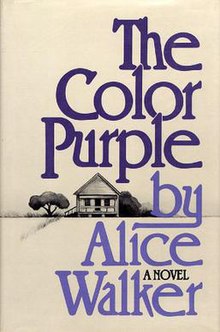The Color Purple

First edition cover
|
|
| Author | Alice Walker |
|---|---|
| Country | United States |
| Language | English |
| Publisher | Harcourt Brace Jovanovich |
|
Publication date
|
1982 |
| ISBN | |
| OCLC | 8221433 |
| 813.54 19 | |
| LC Class | PS3573.A425 C6 1982 |
The Color Purple is a 1982 epistolary novel by American author Alice Walker that won the 1983 Pulitzer Prize for Fiction and the National Book Award for Fiction. It was later adapted into a film and musical of the same name.
Taking place mostly in rural Georgia, the story focuses on the life of African-American women in the southern United States in the 1930s, addressing numerous issues including their exceedingly low position in American social culture. The novel has been the frequent target of censors and appears on the American Library Association list of the 100 Most Frequently Challenged Books of 2000–2009 at number seventeen because of the sometimes explicit content, particularly in terms of violence.
Celie is a poor, uneducated, 14-year-old girl living in the American South in the 1930s. She writes letters to God because her father, Alphonso, beats and rapes her. Alphonso has already impregnated Celie once, a pregnancy that resulted in the birth of a girl. Alphonso takes the baby girl away shortly after her birth. Celie has a second child, a boy, whom Alphonso also abducts. Celie's ailing mother dies after cursing Celie on her deathbed.
Celie and her younger sister, 12-year-old Nettie, learn that a man identified only as Mister wants to marry Nettie. Alphonso refuses to let Nettie marry, instead arranging for Mister to marry Celie. Mister, needing someone to care for his children and keep his house, eventually accepts the offer. Mister and his children, whose mother was murdered by a jealous lover, all treat Celie badly. However, she eventually gets Mister's squalid living conditions and incorrigible children under control.
Shortly thereafter, Nettie runs away from Alphonso and takes refuge at Celie's house, where Mister makes sexual advances toward her. Celie then advises Nettie to seek assistance from a well-dressed black woman that she had seen in the general store a while back; the woman had unknowingly adopted Celie's daughter and was the only black woman that Celie had ever seen with money of her own. Nettie is forced to leave after promising to write. Celie, however, never receives any letters and concludes that her sister is dead.
...
Wikipedia
